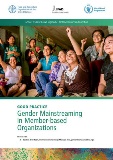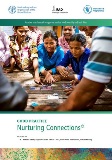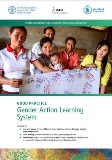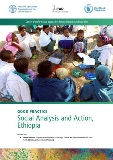Publications

GOOD PRACTICE Gender Mainstreaming in Member-based Organizations
09/12/2020
Toolbox for Gender Mainstreaming in Member-based Organizations is the name of the methodology used to work toward individual empowerment of women and men, in parallel with an intentional change process of organizational structures towards gender equality. This paper outlines the different levels the methodology worked: the individual, enterprises/value chains and organizations while the household-level application is still under development. 10 pp.

GOOD PRACTICE Nurturing Connections©
09/12/2020
Nurturing Connections© was developed and piloted by Helen Keller International (HKI) in 2012. It has been adapted for homestead food production and nutrition and tested in market development initiatives. This publication describes how the curriculum seeks to challenge and transform inequalities related to power relations, traditions and socio-cultural norms that can pose an obstacle to achieving better nutrition and production outcomes. 8 pp.

GOOD PRACTICE Gender Action Learning System
09/12/2020
This publication builds on the experience with Oxfam Novib, a total of 51 ongoing IFAD-supported projects across 26 countries that have some activities related to household methodologies (GALS being the most widely used and innovative household methodology), 37 of which are currently under implementation. 11 pp.

GOOD PRACTICE Joint Programme to Accelerate Progress towards the Economic Empowerment of Rural Women
09/12/2020
The methodology, a holistic, integrated approach to accelerate women’s empowerment: Joint Programme to Accelerate Progress towards the Economic Empowerment of Rural Women (JP RWEE), is based on the premise that an integrated approach to women’s empowerment in development projects has multiplying effects that enhance the reach and sustainability of project outcomes. This publication defines how the JP RWEE aims to respond to the diversity of issues rural women face in their daily lives. 11 pp.

GOOD PRACTICE Farmer Field and Life School
09/12/2020
The implementation of the methodology was developed by FAO Uganda under the programme Consolidating Gains in the Multi-sectoral Prevention and Response to Gender-based Violence (GBV) in North and North Eastern Uganda. The methodology has also been adapted to meet the specific needs of young people in JFFLS. This publication outlines the purpose of the methodology and the domains of gender inequality that are addressed including the reduction of GBV with specific the focus on women and 9 pp.

GOOD PRACTICE Dimitra Clubs
09/12/2020
The Dimitra Clubs are a community-driven approach that facilitates socio-economic empowerment, women’s leadership and self-help. They are informal groups of rural women and men who decide to join together on a voluntary basis to identify their common problems and solve them using local resources. This paper examines how the transformative approach contributes to gender equality and improve rural livelihoods. 12 pp.

GOOD PRACTICE Social Analysis and Action, Ethiopia
09/12/2020
This publication aims to present the goal of the TESFA project which was to bring measurable positive change to the economic status and sexual and reproductive health of ever-married girls. In this context, the Social Analysis and Action (SAA) methodology contributes significantly to an increase in the use of family planning services; a decrease in early child marriages; a more equal division of labour; improvements in communication and decision-making skills; improvements in women’s 9 pp.

GOOD PRACTICE Community Conversations
09/12/2020
Community Conversations involve a series of dialogues among community members on deep-rooted societal norms and taboos that hinder women from actively participating in farmer organizations. The aim is to promote understanding of the issues involved and explore deeper structural issues concerning women’s participation. 8 pp.
